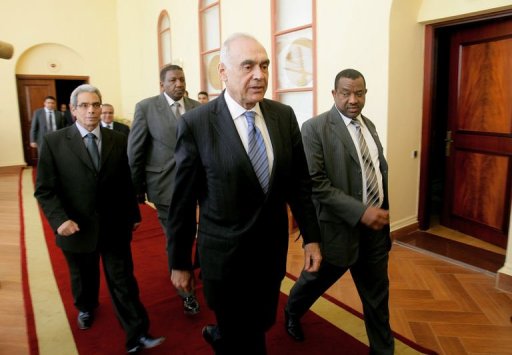
(AFP PHOTO / FETHI BELAID)
AFP – Tunisians marked the third anniversary of the self-immolation of a young street vendor that sparked the first Arab Spring uprising, although anti-government protests failed to draw large crowds on Tuesday.
Around 1,000 unionists and left-wing opposition activists gathered in Sidi Bouzid, the impoverished central town where Mohammed Bouazizi staged his iconic protest on 17 December 2011, for a demonstration against the lack of progress since the revolution.
The demonstrators chanted slogans such as “Work is a right, band of thieves!” and “The revolution unified the people, the Troika [ruling coalition] has divided us!” an AFP journalist reported.
They gathered outside the regional governor’s headquarters, where Bouazizi set himself on fire in a desperate act of protest that led to long-term strongman Zine El Abidine Ben Ali’s ouster and became a fuse for uprisings across the region.
Three years on, unemployment in Tunisia remains stuck at 15%, with that figure rising to 24.4%, the nation’s highest, in the Sidi Bouzid region, home to nearly half a million people.
With popular discontent at the government’s failure to improve living conditions in the marginalised region still running high, President Moncef Marzouki, outgoing Prime Minister Ali Larayedh and parliament speaker Mustapha Ben Jaafar stayed away from planned ceremonies in Sidi Bouzid.
Marzouki and Ben Jaafar were heckled and pelted with stones at last year’s events.
“We have gained nothing from this revolution. I have friends in prison for drugs, others who have died trying to reach Italy illegally, and some who have died fighting [with jihadist rebels] in Syria,” said Bilel, a young protester from the poor Enoor neighbourhood of Enoor.
A rival demonstration by supporters of the ruling Islamist party Ennahda drew about 300 people.
In the capital, events to mark three years since the uprising were equally muted.
Marzouki and Larayedh took part in a discreet ceremony at the presidential palace, according to photographs distributed by the presidency.
“We have the right to be proud of what we have achieved,” Marzouki said in a speech published by his office.
He highlighted the “freedom of expression and opinion” among the revolution’s gains, and the fact that Tunisia has not succumbed to the violence plaguing other Arab Spring countries.
A planned protest outside the government’s headquarters in the Kasbah district called by Ansar al-Sharia, a banned jihadist group designated a “terrorist organisation” by the authorities, attracted only a few hundred people.
“We are here to confront the injustice and oppression of the marginalised. When Ben Ali was in power he called the Islamists terrorists to impose his dictatorship. The same scenario is repeating itself now,” said Marouane Jidda, one of the organisers.
Since the assassination in July of opposition MP Mohamed Brahmi, police have carried out multiple arrests aimed at weakening the secretive group.
The authorities accuse Ansar al-Sharia of being behind the murder of Brahmi and Chokri Belaid, another leftist politician killed earlier this year, accusations that the group denies.
The murders plunged Tunisia into a deep political crisis which began to ease in October when the ruling Islamists and the mainly secular opposition struck a hard-won agreement to form an interim government of independents pending fresh elections.
And after months of wrangling, Tunisia’s political parties agreed Saturday to choose Industry Minister Mehdi Jomaa to head a government of independent figures tasked with organising elections in 2014.
But the protracted crisis and resulting economic malaise have fuelled social discontent and led organisers of Tuesday’s events to insist that the country’s leaders were not welcome in Sidi Bouzid.
Jomaa was chosen a day after a previous pick for premier, Mustapha Filali, 92, ruled himself out due to his age.
Ennahda, which has led the coalition government since Tunisia held its first freely contested elections in October 2011, has been sharply criticised, notably for its failure to create jobs and to prevent a surge in jihadist violence.
“Three years have gone by and nothing has changed. The social and economic situation is still difficult and the region has plunged into misery,” activist Mondher Chaibi said ahead of Tuesday’s demonstrations.



